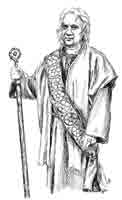Burning Shek-Pvar
This page provides suggestions for creating Shek-Pvar characters using the BW rules.
 Shek-Pvar Lifepaths
Shek-Pvar Lifepaths
Shek-Pvar characters can be burned up using the Lifepaths of Man from Burning Wheel Gold and/or the College of Magic Sub-setting outlined in the I Burn Wizards chapter of the Magic Burner.
Specific suggestions can be found in the Guild of Arcane Lore entry on the Guild Lifepaths page of this site.
NOTE: To reflect the convocational nature of Pvaric
magic, any lifepath which confers the Gifted trait
should instead confer Convocational
Attunement.
Spell Selection
Shek-Pvar mages pick spells using their Resource points, as specified in Burning Wheel Gold. They are limited, however, to choosing spells appropriate to their convocations. (They may also select Gray Magic spells.) Please see the Pvaric Convocations & BW Sorcery section of the Convocations page for details
Convocational Skills
Shek-Pvar mages often learn skills related to their convocations. Shek-Pvar characters, therefore, may use their Specific Skill points to open skills from the following lists, based upon their convocational attunement(s), in addition to skills conferred by lifepaths:
Peleahn: Firebuilding, Fire-wise, Heat-wise, Speed-wise, Smoke-wise
Jmorvi: Armorer, Blacksmith, Crafted Object-wise, Lockcraft, Metal-wise, Tools-wise, Weaponsmith, Whitesmith
Fyvria: Anatomy, Brewing, Death-wise, Decay-wise, Disease-wise, Farming, Health-wise, Herbalism, Midwifery, Plant-wise, Soil-wise, Stone-wise, Tree Cutting, Vintner
Odivshe: Cold-wise, Gloom-wise, Quiescence-wise, River-wise, Seamanship, Sea-wise, Ship-wise, Water-wise
Savorya: Ancient Languages, Calligraphy, Cartography, Cryptography, Emotion-wise, Foreign Languages, Illuminations, Knowledge-wise, Symbology, Writing-wise
Lyahvi: Air-wise, Appearance-wise, Color-wise, Light-wise, Lightning-wise, Scent-wise, Sound-wise
At GM/group discretion, Shek-Pvar characters may be given an additional 2-3 Specific Skill points to be spent on these skills.
The Shek-Pvar Code & Beliefs
The Shek-Pvar is not a centralized organization, but a loosely affiliated group of autonomous chantries. Chantries vary in how they govern themselves, but most expect members to adhere to the following rules:
- Bring not the scorn of the Kvikir [non-mages] upon thy brothers, nor
make with thyne art a place for thyself above them.
- Spread not thy lore, even among thy brothers, without sanction of thy
peers.
- Keep sacred and free from harm thy house of lore.
- Succour not a renegade of the art, but strike him down with thy power,
else summon brothers to thyne aid.
- Make tithe to thyne house a portion of thyne treasure for thy brothers' benefit.
Although players should choose Beliefs and Instincts that reflect their actual player priorities, it may be worthwhile for Shek-Pvar characters to try and come up with at least one interesting belief (or instinct) related to the Shek-Pvar Code. GMs should also prepared to challenge that belief in play.